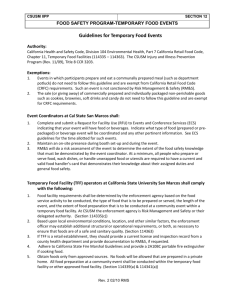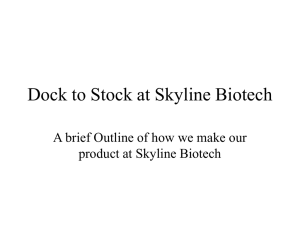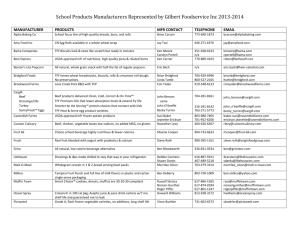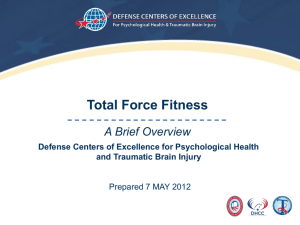INFORMATIONAL BULLETIN
advertisement
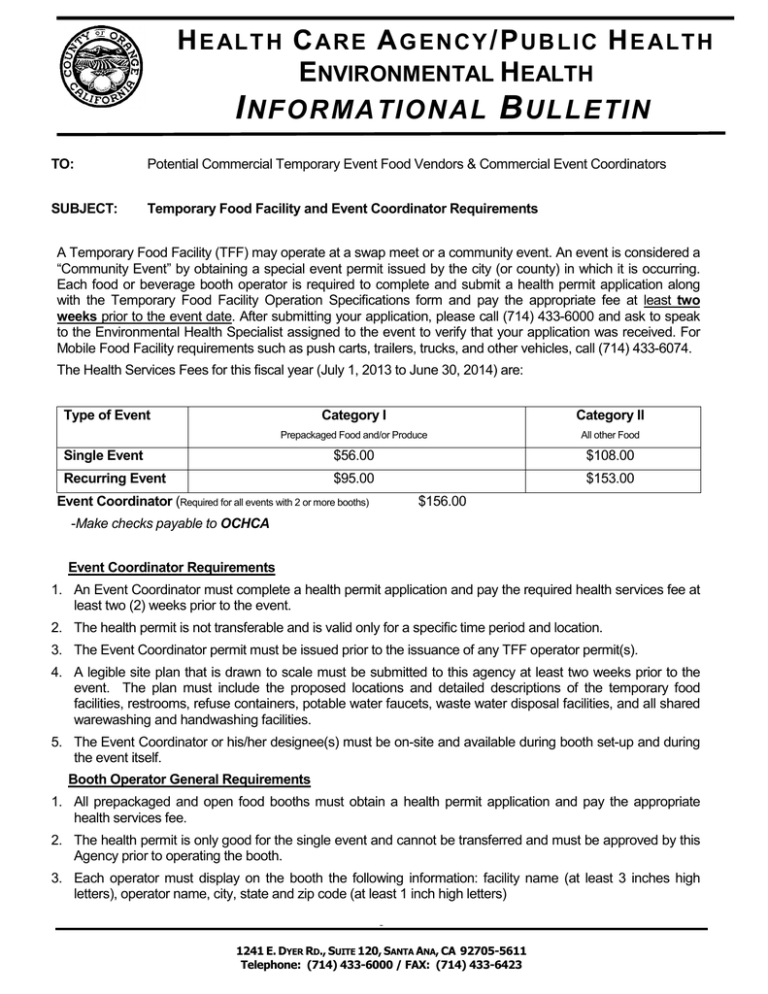
H E AL T H C AR E A G E N C Y /P U B L I C H E AL T H ENVIRONMENTAL HEALTH I NFORMATIONAL B ULLETIN TO: Potential Commercial Temporary Event Food Vendors & Commercial Event Coordinators SUBJECT: Temporary Food Facility and Event Coordinator Requirements A Temporary Food Facility (TFF) may operate at a swap meet or a community event. An event is considered a “Community Event” by obtaining a special event permit issued by the city (or county) in which it is occurring. Each food or beverage booth operator is required to complete and submit a health permit application along with the Temporary Food Facility Operation Specifications form and pay the appropriate fee at least two weeks prior to the event date. After submitting your application, please call (714) 433-6000 and ask to speak to the Environmental Health Specialist assigned to the event to verify that your application was received. For Mobile Food Facility requirements such as push carts, trailers, trucks, and other vehicles, call (714) 433-6074. The Health Services Fees for this fiscal year (July 1, 2013 to June 30, 2014) are: Type of Event Category I Category II Prepackaged Food and/or Produce All other Food Single Event $56.00 $108.00 Recurring Event $95.00 $153.00 Event Coordinator (Required for all events with 2 or more booths) $156.00 -Make checks payable to OCHCA Event Coordinator Requirements 1. An Event Coordinator must complete a health permit application and pay the required health services fee at least two (2) weeks prior to the event. 2. The health permit is not transferable and is valid only for a specific time period and location. 3. The Event Coordinator permit must be issued prior to the issuance of any TFF operator permit(s). 4. A legible site plan that is drawn to scale must be submitted to this agency at least two weeks prior to the event. The plan must include the proposed locations and detailed descriptions of the temporary food facilities, restrooms, refuse containers, potable water faucets, waste water disposal facilities, and all shared warewashing and handwashing facilities. 5. The Event Coordinator or his/her designee(s) must be on-site and available during booth set-up and during the event itself. Booth Operator General Requirements 1. All prepackaged and open food booths must obtain a health permit application and pay the appropriate health services fee. 2. The health permit is only good for the single event and cannot be transferred and must be approved by this Agency prior to operating the booth. 3. Each operator must display on the booth the following information: facility name (at least 3 inches high letters), operator name, city, state and zip code (at least 1 inch high letters) STE120 1241 E. DYER RD., SUITE 120, SANTA ANA, CA 92705-5611 Telephone: (714) 433-6000 / FAX: (714) 433-6423 4. Each booth must have a Person-in-Charge (PIC) or a designee. The TFF permit holder is the PIC who shall be present at the TFF during all hours of operation. 5. All foods shall be obtained from approved sources. No foods from a private home shall be used, stored, offered for sale or given away. 6. All foods, utensils and other related items must be stored at least six (6) inches off the ground and adequately protected from contamination while being transported, stored, prepared, displayed and served. 7. All equipment and utensils must be smooth, non-absorbent, easily cleanable, and made of non-toxic materials. 8. All prepackaged foods offered for sale must be properly labeled. 9. All bulk food ingredient containers shall be covered and clearly labeled as to their contents. 10. All condiments outside of the enclosed booth must be prepackaged or dispensed from approved pump squeeze or pour-type devices. 11. Potentially hazardous foods that are held at or below 45°F for up to 12 hours in any 24 hour period, or at or above 135°F, are to be destroyed at the end of the operating day, unless foods have been continuously held under mechanical refrigeration at or below 41°F. 12. Approved hot and cold holding equipment shall be provided to ensure proper food temperature control during transportation, storage, and operation. 13. Ice used for refrigeration purposes shall not be used for consumption in food or beverages. 14. A suitable and an accurate small-diameter probe thermometer shall be available as needed. 15. All food preparation, food storage, and warewashing areas are to be equipped with overhead protection. 16. No live animal, bird, or fowl shall be allowed within 20 feet of the booth. 17. At least one approved toilet facility for each 15-employees/food handlers shall be provided within 200 feet of each TFF. 18. One mechanical handwash facility with warm running water (100°F) and under pressure shall be provided for each required toilet facility. 19. Single-service soap and paper towel dispensers shall be provided at each handwash facility. 20. A janitorial sink shall be provided on site as needed. 21. All hoses transporting potable water must be food-grade quality. Garden-type hoses are not acceptable. 22. All liquid waste must be properly disposed of (i.e., sewer system, wastewater holding tank). Wastewater holding tanks must be large enough to capture the total daily intake of wastewater. 23. All TFFs shall be readily disassembled for storage and transporting, and be capable of being readily assembled to its original integrity. Prepackaged Food Booths (Category I) 1. All foods must be kept at least 6 inches off the ground. An overhead protection is required and shall be made of approved materials. Dirt floor is not approved. 2. No open food sampling or food processing is allowed on site. Beverages may be poured from an original manufacturer’s container into a disposable cup as a single serving. 3. All foods must be pre-packaged at an approved permitted facility. 4. In lieu of a handwash station, cold water with a germicidal soap may be provided. Unpackaged Food Booths (Category II) 1. The Person-in-Charge (PIC) shall have adequate knowledge of, and shall be properly trained in, food safety principles as it relates to their assigned duties. 2. The booth must be fully enclosed. Walls or half walls and ceilings shall be constructed of smooth, durable and easily cleanable materials. 3. Pass-through openings shall be no larger than 432 square inches. F042-09.1345, REV: 10/4/2013, TFF.doc/infobull 4. Minimum screening size is 16-mesh. 5. A durable and readily cleanable floor surface shall be provided within the TFF. (For example, concrete, asphalt, or wood). 6. In lieu of fully enclosed food booth, unpackaged foods may be prepared within a food compartment, or enclosed areas of the booth, with doors or an access cover which are kept closed except when dispensing food. 7. A three-compartment sink with two integral metal drain boards and with hot (120ºF) and cold running water shall be provided within each TFF except if: a. A sink exists within 100 feet of the booth in a permitted facility owned by the same person/entity. b. A common, centrally located sink may be used for as many as four unpackaged booths. 1) No food preparation in the common sink. 2) A canopy shall be provided over the common sink. 3) The sink shall be no farther than 100 feet from any of the booths using it. 4) The sink compartments and drain boards shall be large enough to accommodate the largest utensil or piece of equipment to be cleaned in the sink. 8. Handwashing facilities must be provided in each booth. Handwash facilities include warm water (provided in an insulated container), a bucket to catch the wastewater, liquid pump soap, and single service paper towels. 9. BBQ units, grills or other approved outdoor cooking equipment may be located adjacent to the TFF if local building or fire codes prohibit cooking inside the TFF. BBQ units (or other cooking equipment) must be separated from public areas in a manner that prevents access by customers to the cooking area. (e.g., sneeze guard) 10. All foods that are going to be cooked on the outdoor equipment must be stored inside the booth. Only small quantities of food in closed containers awaiting the cooking process may be allowed outdoors. 11. All food preparation must take place within the booth. 12. Foods may be either served from the cooking equipment or from the pass-through window. F042-09.1345, REV: 10/4/2013, TFF.doc/infobull Example of TFF Event Coordinator Parking site plan: LEGEND TFF 1 TFF 2 TFF 6 TFF 3 <200 feet Main Entrance A Street TFF 4 TFF 9 TFF 7 TFF 10 TFF 8 TFF 13 TFF 12 Fresh Water Waste Water Warewashing Sink Refuse Container Restrooms and Handwashing Facilities TFF 5 TFF 11 TFF 1 TFF 2 TFF 3 TFF 4 TFF 5 TFF 6 TFF 7 TFF 8 TFF 9 TFF 10 TFF 11 TFF 12 TFF 13 Jeff’s Pizza Juice for Me Chip Chip Cookies Grandma’s BBQ Suds N’ Spuds Taste Best Thai Food Earth Foods Veggie for Ever Popcorn Galore All Sandwiches BBQ Pork & More House of Chicken Note: 1. TFF 13 will provide its own warewashing sink B Street Example of TFF setup: Example of TFF Handwashing Station: 100F Events over 3 days require mechanical handwash sink F042-09.1345, REV: 10/4/2013, TFF.doc/infobull Orange County Health Care Agency Environmental Health Division 1241 E. Dyer Road, Suite 120, Santa Ana, Ca 92705 Telephone: (714) 433-6000 Fax: (714) 433-6423 Web Site: www.ochealthinfo.com TEMPORARY FOOD FACILITY OPERATION SPECIFICATIONS Event Name: ___________________________________________________________________________________ Business Name: ________________________________________________________________________________ Address: ______________________________________________________________________________________ Name: ________________________________________________________________________________________ Phone Number: _________________________________________________________________________________ Following shall be completed by the operator of the temporary food facility. Check the box which best explains your operation. More than one answer may apply to a question. If a question does not apply to you, leave it blank. 1. Which one of the following best describes your operation during this event? No cooking; assembly only (Example: Sandwiches, Drinks) Single cooking step and assembly (Example: Burgers) Cooking, cooling, reheating, etc Properly pre-packaged potentially hazardous food (Perishable food) Properly packaged non- potentially hazardous food (Non-perishable food) Uncut, whole produce Other ___________________________________________________________________________________ 2. How will food be transported and steps taken to prevent contamination of foods? Food is properly covered during transportation Cold/frozen food is maintained at or below 41ºF during transportation Hot food is maintained at or above 135ºF during transportation All food preparation takes place in an approved facility or inside the booth Food is obtained from approved sources and not obtained, prepared, and/or stored in private home Outdoor cooking equipment are protected from public access Only approved equipment and containers are used 3. Which one of the following describes your handwashing practices? One handwash sink with 100ºF running water under pressure is provided inside the booth (Events over 3 days) Warm water in an insulated container with catch bucket is provided (Events less than 3 days) Cold water with a germicidal soap is provided (Pre-packaged only) Single-service soap and paper towel dispenser is provided 4. How will cold potentially hazardous food be maintained at or below 41ºF? Inside an approved electrical refrigeration unit Stored on ice, inside ice chest Displayed on top of ice Inside refrigerated cart/truck/trailer Inside insulated bag 5. How will hot potentially hazardous food be maintained at or above 135ºF? Inside steam table Inside hot holding cabinet/unit/bag On top of cooking equipment F042-09.1345, REV: 10/4/2013, TFF.doc/infobull 6. Where will food be stored when the facility is not in operation? Stored inside the booth protected from any type of contamination Returned to an approved food facility Leftovers are discarded at the end of the day Stored inside refrigerated trailer Other ___________________________________________________________________________________ 7. What are the procedures for cleaning utensils and equipment? A three-compartment sink is provided inside the booth A centrally located three-compartment sink exists within 100 feet of the booth (shared by no more than 4 booths) Hot water of 120ºF and cold running water is provided at the sink Approved sanitizer such as chlorine is available in the sink Sanitizer test strips are provided 8. What are the procedures for cleaning structure and disposal of waste? Inside the booth is cleaned as needed during the event or at the end of each day Rubbish is picked up by the event staff or booth operators Approved and adequate trash dumpster is provided Waste water is properly disposed of 9. What type of material and methods are being used to construct the temporary food facility? A durable and readily cleanable floor surface such as concrete, asphalt, wood or tarp is provided The booth is fully enclosed Pass-through openings are a minimum of 432 square inches Minimum screening size of 16 mesh is used A canopy is provided over the common three-compartment sink Other ___________________________________________________________________________________ In the area below draw a diagram of the site plan for the food operation at this event. You may use additional paper or a separate pre-printed diagram and submit it with this form. (Include the proposed layout of equipment, food preparation tables, food storage, warewashing, and handwashing.) F042-09.1345, REV: 10/4/2013, TFF.doc/infobull Orange County Health Care Agency Environmental Health Division 1241 E. Dyer Road, Suite 120, Santa Ana, CA 92705 Telephone: (714) 433-6000 Fax: (714) 433-6423 Web Site: www.ochealthinfo.com APPLICATION FOR HEALTH PERMIT TEMPORARY FOOD FACILITY This Section To Be Completed By Applicant- Please Print – Do Not Detach Operator Copy - Health Permits Are NOT Transferable Name of Event: Name of Event Coordinator: Phone: Event Location: City: Business Name: Zip: Owner’s Name (Authorized Representative): Business Address: Phone: City: Cell Phone: E-Mail Address: Zip: Fax: Owner’s Mailing Address: City: Emergency Contact: Zip: Emergency Phone: Nature of Business/Type of Food: Operation Date(S): Operation Days: S M T W T F S Any Food Prepared/ Stored Before The Event: Name: Yes All Days No Operation Hours: _____Am/Pm To _____Am/Pm If Yes, Provide Name and Address of the Approved Facility: ________________________________________________________________________________________________________ Address: ________________________________________________________________________________________________ Yes Is the Facility located in the County of Orange: No Are you Preparing/Storing Food at a Shared Food Facility: If No, Attach a copy of the Facility Health Permit . Yes No If Yes, Provide the completed Shared Food Facility Agreement. I Hereby Make Application For A Health Permit And/Or Environmental Health Services Date: Signature: Print Name: Title: Date of Birth: Driver’s License No: Federal Tax ID: SPECIALIST For Office Use Only Permit Approved By: Date: Permit Valid Only For A Specific Time Period And Location Operational Limitation(S): Type of Establishment/PE: FEE Permit Number: HSO Receipt Number: This Application Is For: Category I (Prepackaged Food and/or Produce, No Sampling) Category II (All Other Foods, Including Poured Beverages, Unpackaged Samples) Event Coordinator (Administrator, Organizer, Manager of Community Event) Event Frequency: Single Recurring Fee Amount: Fee Amount Paid Fee Amount Unpaid This Permit Is Valid For: SPECIFICATIONS Sampling: Yes No Cooking: Operation Specifications Submitted: Yes Yes No No Cooking Limitation: If no, date to be submitted: Remarks: F042-09.1609 (R5/12) Distribution: White – Main File Canary – Operator/Coordinator Pink – Specialist
